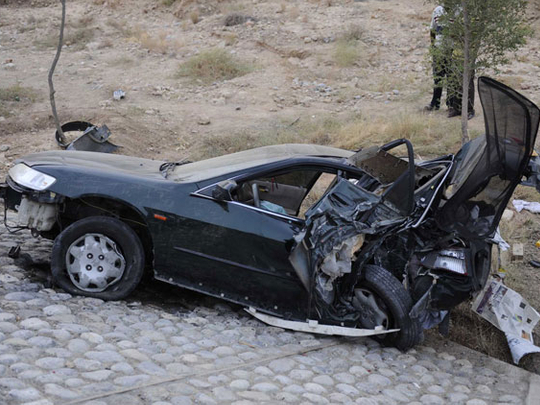
Muscat: Fatigue was one of the main causes of a spate of accidents on the road to Salalah during the Eid Al Fitr holidays, according to a senior officer with the Royal Oman Police (ROP).
“In most cases, accidents happened after about a 300km drive and tired body and mind caused these accidents,” Lieutenant Colonel Ali Sulayem Jameel Al Falahi, Director of Traffic Engineering, Directorate-General of Traffic at the ROP, told Gulf News on Sunday.
He believes most motorists drive throughout the night as they travel for more than 1,000km to reach Salalah.
Talking about the other causes, he pointed to negligence.
“If you take the horrific accident near Mughsail, entering the junction without properly looking caused it, so it was negligence.”
He disagreed that Salalah was not geared to handle huge inflow of tourists.
According to the tourism department statistics, 94,000 people visited Salalah during the Eid Holidays. “The accidents had nothing to do with big turnout but were caused either by fatigue or negligence,” he reiterated.
Deepak Kamath, Country Manager at AXA Insurance, also agreed that negligence majorly contributed to the fatal accidents in Oman.
However, he also feels that topography of the country increases severity of traffic accidents in Oman unlike in the other GCC countries.
“Mountains and winding roads, especially outside of Muscat, increase fatal accidents,” he added.
The green winding mountains of Oman’s southern region were literally besieged by tourists from within the country and neighbouring GCC countries.
“This year, the rush to Salalah was unprecedented, causing unseen traffic gridlocks in this otherwise sleepy town,” Manpreet Singh, Chairman of the Indian Social Club in Salalah told Gulf News.
He added that the rush was so much that some of the supermarkets ran out of daily essentials like break and milk.
“People were seen sleeping by the roadside because of the lack of accommodation,” he revealed, adding that some of the government schools were opened to accommodate visitors.
This year, Khareef Season coincided with the Holy month of Ramadan thus visitors largely stayed away from visiting Salalah but descended in large numbers once the Eid holidays.
The two major accidents, one near Haima saw nine people killed and another near Mughsail, Salalah, in South Oman, which also killed nine, including seven members of the Emirati Kaabi family.
Most visitors prefer to drive down to Salalah and the road covering over 1,000km has long stretches of single carriageway, some without street lights.
“People drive with ‘killer speed’,” Muscat-born Indian expatriate Pranav Mehta told Gulf News.
The young entrepreneur drove down to Salalah during the recent Eid holidays and confessed to over speeding on the long stretches.
“We were over speeding but there were some fancy cars that sped past us at not less than 200km/h speed,” he believes.
“I shuddered with the thought of the consequences if something happened to such cars at high speed,” he added.
The speed and wrong overtaking caused some of the accidents on the Muscat-Salalah road, killing 65 people in 13 days.
The death toll during Eid Al Fitr holidays last year was 28.
However, the deaths due to traffic accidents in July and August in Oman came down by about 40 per cent this year.
Last year, 224 people died during the months of July and August while this year it is about 180 during the same period.












